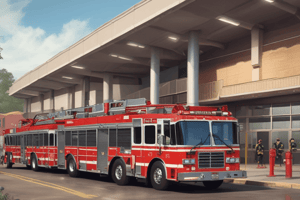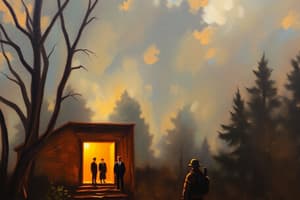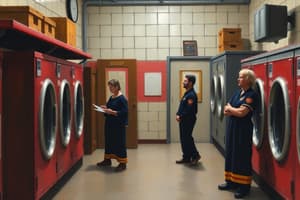Podcast
Questions and Answers
Who should the station personnel notify first after a site safety inspection by a state or federal agency?
Who should the station personnel notify first after a site safety inspection by a state or federal agency?
- The Chief of Operations
- The Deputy Chief of Operations
- The Chief of Safety
- The District/Battalion Chief (correct)
When must a hard copy of a citation be delivered to a District/Battalion Chief?
When must a hard copy of a citation be delivered to a District/Battalion Chief?
- By the end of the week it was issued
- Within three business days
- The same day it is issued, or contact them that day if a hand delivery is not possible. (correct)
- Within 24 hours of its issuance
Who is responsible for conducting monthly inspections of fire stations?
Who is responsible for conducting monthly inspections of fire stations?
- The Chief of Operations
- The Station Captain
- The Deputy Chief of Operations
- The District/Battalion Chief (correct)
By what day of each month must the Monthly Station Inspection Forms be delivered to the Deputy Chief of Operations?
By what day of each month must the Monthly Station Inspection Forms be delivered to the Deputy Chief of Operations?
If a station is deemed unsafe to occupy due to a deficiency, who has the authority to re-assign the apparatus and crew?
If a station is deemed unsafe to occupy due to a deficiency, who has the authority to re-assign the apparatus and crew?
What is the maximum number of consecutive shifts an RV or boat can be left at a fire station?
What is the maximum number of consecutive shifts an RV or boat can be left at a fire station?
Where are on-duty personnel required to be, in relation to the alarm system, while at the station?
Where are on-duty personnel required to be, in relation to the alarm system, while at the station?
Before leaving the station or fireground, who must personnel obtain permission from?
Before leaving the station or fireground, who must personnel obtain permission from?
Who establishes the normal Station Work Routine?
Who establishes the normal Station Work Routine?
If a shift falls on a legal holiday, what is the standard work routine?
If a shift falls on a legal holiday, what is the standard work routine?
What are the permissible hours for recreational activities?
What are the permissible hours for recreational activities?
What is the rule regarding sleeping without underclothing?
What is the rule regarding sleeping without underclothing?
During what time period are daily rest periods on Sunday permitted?
During what time period are daily rest periods on Sunday permitted?
On what day should mattresses be stood on end and aired out?
On what day should mattresses be stood on end and aired out?
Between what hours should Floor Watch be maintained?
Between what hours should Floor Watch be maintained?
What is the established time for evening sleeping hours?
What is the established time for evening sleeping hours?
Which type of canine is NOT allowed in a fire station?
Which type of canine is NOT allowed in a fire station?
Who is responsible for approving canines in the USAR or Peer Support programs?
Who is responsible for approving canines in the USAR or Peer Support programs?
What is a requirement for a USAR handler?
What is a requirement for a USAR handler?
Where are canines NOT authorized to be?
Where are canines NOT authorized to be?
What should happen if a canine is found to be aggressive towards personnel?
What should happen if a canine is found to be aggressive towards personnel?
What is a primary responsibility for personnel on Floor Watch?
What is a primary responsibility for personnel on Floor Watch?
Under what condition can personnel on Watch leave their post?
Under what condition can personnel on Watch leave their post?
What should JFRD personnel do when a Chief or City Official enters a JFRD station?
What should JFRD personnel do when a Chief or City Official enters a JFRD station?
During standard work hours, what is the standard procedure for visitors?
During standard work hours, what is the standard procedure for visitors?
When answering a JFRD station telephone, what information is given first?
When answering a JFRD station telephone, what information is given first?
What is the initial step personnel should take when they have difficulty finding a phone number that they need?
What is the initial step personnel should take when they have difficulty finding a phone number that they need?
How should personnel handle phone calls during training?
How should personnel handle phone calls during training?
Under what condition may long-distance calls be made from JFRD stations?
Under what condition may long-distance calls be made from JFRD stations?
During emergency responses, what is the permitted cell phone usage?
During emergency responses, what is the permitted cell phone usage?
What is the time limit for a personal call on a JFRD phone?
What is the time limit for a personal call on a JFRD phone?
Who is responsible for maintaining a log of personnel contact information at a station?
Who is responsible for maintaining a log of personnel contact information at a station?
Which of the following actions is NOT a responsibility of personnel regarding station visitors?
Which of the following actions is NOT a responsibility of personnel regarding station visitors?
What action should personnel take when they experience issues with JFRD equipment such as a radio, computer or printer?
What action should personnel take when they experience issues with JFRD equipment such as a radio, computer or printer?
Where is turnout gear permitted inside a JFRD facility?
Where is turnout gear permitted inside a JFRD facility?
What is the correct procedure for reporting lost, stolen, or damaged equipment?
What is the correct procedure for reporting lost, stolen, or damaged equipment?
Are Peer Support Team station dogs considered service animals?
Are Peer Support Team station dogs considered service animals?
Flashcards
JFRD Station Inspection Procedure
JFRD Station Inspection Procedure
The process for JFRD stations after inspections by state or federal agencies. It involves notifying the relevant district/battalion chief, the Chief of Safety, and escalating citations to the district/battalion chief.
JFRD Monthly Inspections
JFRD Monthly Inspections
Monthly inspections of JFRD stations conducted by the District/Battalion Chief and the OIC. The inspections are documented on the Monthly Station Inspection Form, and any dangerous deficiencies are reported immediately.
Gatherings at JFRD Stations
Gatherings at JFRD Stations
JFRD stations requiring approval from the station captain, district chief, and director/fire chief for any type of gathering on the station premises. Union meetings follow the rules outlined in the Union Contract.
Personal Vehicles at JFRD Stations
Personal Vehicles at JFRD Stations
Signup and view all the flashcards
Responding to Alarms at JFRD Stations
Responding to Alarms at JFRD Stations
Signup and view all the flashcards
Permission to Leave Duties
Permission to Leave Duties
Signup and view all the flashcards
Normal Work Routine
Normal Work Routine
Signup and view all the flashcards
Holiday Work Routine
Holiday Work Routine
Signup and view all the flashcards
Game Time
Game Time
Signup and view all the flashcards
Sleeping Regulations
Sleeping Regulations
Signup and view all the flashcards
Sleeping Hours
Sleeping Hours
Signup and view all the flashcards
Mattress Maintenance
Mattress Maintenance
Signup and view all the flashcards
Floor Watch
Floor Watch
Signup and view all the flashcards
Floor Watch Time
Floor Watch Time
Signup and view all the flashcards
Canines in JFRD stations
Canines in JFRD stations
Signup and view all the flashcards
Canine hygiene and responsibility
Canine hygiene and responsibility
Signup and view all the flashcards
Canine access restrictions
Canine access restrictions
Signup and view all the flashcards
Canine kenneling requirements
Canine kenneling requirements
Signup and view all the flashcards
Consequences for canine behavior
Consequences for canine behavior
Signup and view all the flashcards
Floor Watch Responsibilities
Floor Watch Responsibilities
Signup and view all the flashcards
JFRD Station Visitors
JFRD Station Visitors
Signup and view all the flashcards
Visitor Time Limit
Visitor Time Limit
Signup and view all the flashcards
Detrimental Visits
Detrimental Visits
Signup and view all the flashcards
Long Distance Calls
Long Distance Calls
Signup and view all the flashcards
Phone Call Time Limit
Phone Call Time Limit
Signup and view all the flashcards
Training Calls
Training Calls
Signup and view all the flashcards
Visit Termination Time
Visit Termination Time
Signup and view all the flashcards
How to answer JFRD phones
How to answer JFRD phones
Signup and view all the flashcards
Cell phone use on duty
Cell phone use on duty
Signup and view all the flashcards
Reporting equipment problems
Reporting equipment problems
Signup and view all the flashcards
Updating contact information
Updating contact information
Signup and view all the flashcards
Storing turnout gear
Storing turnout gear
Signup and view all the flashcards
Canine policy in stations
Canine policy in stations
Signup and view all the flashcards
Communication when answering phones
Communication when answering phones
Signup and view all the flashcards
Reporting equipment loss/damage
Reporting equipment loss/damage
Signup and view all the flashcards
Study Notes
Standard Operating Procedures (SOP) for Lieutenants
- Purpose: Defines duties and responsibilities for Lieutenants, and promotion requirements
- Rank/Position: Commanding officer for their company during their shift; authority over company personnel
- Duties/Responsibilities: Follow verbal and written instructions from company Captain, station Captain, and District Chief; perform duties as outlined in SOP 208 (Company Officer)
- Senior Lieutenant: In charge of the company during the Captain's absence
General Promotional Requirements for Lieutenants
- Engineers serving as Lieutenant must complete 12 months at the Engineer rank before the exam
- Provisional time does not count toward the 12-month requirement
- Must hold a Municipal Fire Inspector I certification, and maintain current certification
- Must hold a State of Florida Paramedic certificate, and maintain current certification
- Must hold NIMS Incident Command I-100 and I-200 certifications
- Must hold JFRD Fire Officer I or State of Florida Fire Officer I certifications (closed to new applicants as of 1/2/2019)
- Must hold an A.S./B.S. in Fire Science and/or EMS Management
- Submitted certifications to the Training Academy by the application deadline. Same certifications needed on repeating application if not promoted after initial application
Standard Operating Procedures (SOP) for Company Officers
- Purpose: Defines the role of a company officer within the JFRD
- Rank/Position: In charge of a company, including Captains, Lieutenants, and Engineers that are out of position
- Duties/Responsibilities: Company officers are responsible for ensuring that personnel under their supervision acquire the knowledge required for their positions
- Rescue Company Officers: Must have knowledge of emergency medical care and control, and location of streets and buildings in their territory
- Suppression Company Officers: Must have detailed knowledge of fire prevention and extinguishment, and location of streets and water sources
- Oversee Subordinates: Set a good example, provide guidance and encouragement, explain rules and regulations. Ensure subordinates follow orders and maintain discipline
- Disagreements: Settle disagreements within the district through the chain of command, appropriate Division Chief for complex matters
- Rule Infraction Charges: Initiate charges for personnel misconduct, provide a report of violations by the company officer to the appropriate division chief and supply the charged individual with a copy.
- Training: Responsible for training personnel in accordance with JFRD SOPs, SAPs and SOGS, and performing practical drills; ensuring probationary firefighters learn territory knowledge (SOP 212.05.03) in a 90 day period. Document all training in the daily Log and Target Solutions.
Standard Operating Procedures (SOP) for Engineers
- Purpose: Defines duties and responsibilities for Engineers and promotion requirements
- Rank/Position: Primary operators of JFRD apparatus. In charge of the company in the absence of the company officer
- Duties/Responsibilities: Perform any duties required by superiors; thorough knowledge of the operation of the apparatus as well as that carried on other apparatus that normally respond; general knowledge of major city streets and buildings relevant to their assigned territory.
- Knowledge Required, Preventive Maintenance, Apparatus Back in Service, Assist Company Officer.
- General Promotional Requirements: Firefighters must complete 12 months of service at the rank of Firefighter before the promotional examination. Compliance with 1302 Apparatus Operations and 703 Aerial Operations requirements.
Standard Operating Procedures (SOP) for Firefighters
- Purpose: Defines duties and responsibilities of Firefighters
- Rank/Position: Essential operational personnel.
- Duties/Responsibilities: Perform assigned duties by superiors, knowledge of major city streets and buildings, location of water supplies, schools and other high-hazard structures. Operational skills relative to the fire service.
- Training: Participation in company drills, maintenance of physical and mental health for performance of assigned duties.
- Apparatus Back in Service: Prompt handling of apparatus after assignments to ensure rapid return into service.
- Riding Out of Position: The firefigher will perform the duties of the Engine in the instance that the officer is not present.
- Deficiencies: Addresses the need for familiarization with the details of the apparatus, training areas, etc.
- Examinations: Includes written, oral, and practical components with a 7-month and 11-month exam. The content will include territory specifics, equipment functionality, and company operational knowledge.
Standard Operating Procedures (SOP) for Probationary Firefighters
- Purpose: Guides training for probationary firefiighters
- Conditions: Probationary period of 12 months. Completing tasks outlined in the Probationary Firefighter Task Book. 7 and 11-month examinations, satisfactory monthly reviews, Vector Solutions assignments.
- Administration and Documentation of Training: Upon training completion, Firefighter gets the tasks booklet, checklists and skills sheets. Completing driver and apparatus training before the 7-month test.
- Examinations: Completing 7 and 11-month written, oral, and practical exams; passing grade of 80% required.
Standard Operating Procedures (SOP) for Attendance Policy
- Purpose: Provides an overview of JFRD attendance policy
- Making Relief: Personnel working 24 hour shifts must report to their work location no later than 0800 hours; personnel on other than 24 hour shifts must report no later than the designated start time for their shift; Personnel shall remain on duty throughout the designated time unless an approved leave has been obtained.
- Working Away From Regular Assignment: Personnel may be required to work away from their assigned work location to meet staffing requirements or when swapping time.
- Work Holidays: Personnel shall report to duty and remain on duty as usual unless an approved leave has been obtained.
- Leave: Obtain permission from the District/Battalion Chief. Must use RMS for requesting leave, other than FMLA leave
- Sick Leave: Personnel notifies the company officer of inability to report to work due to illness. Must report for duty their next scheduled day. If unable to report on the next scheduled day, notify the on-duty company officer in a timely manner.
- Military Leave: Employees must notify their company officer of the dates for their leave, along with providing the official orders.
- Paid Parental Leave: Eligibility requirements and 6 weeks of paid leave per period
- Time Swaps: Personnel can swap time with other personnel via approval by the company officer, and District/Battalion Chief
- Recall: Mayor can suspend provisions of union Contract when civil emergency conditions exist such as riots, civil disorders, hurricanes.
Standard Operating Procedures (SOP) for Station Procedures
- Purpose: Develop Station Standard Operations, Site Safety Inspections, monthly JFRD station inspections, gatherings, personal vehicles.
- Site Safety Inspections: Notify appropriate district/battalion chief, chief of safety. Report of results for citations. Submit a hand delivered or email the District/Battalion chief for citations not delivered in person
- JFRD Monthly Inspections: Responsibility of District/Battalion chief; OIC accompanies; document deficiencies in the Monthly Station Inspection form
- Gatherings: Obtain Approval from Station Captain, District Chief, and Director/Fire Chief prior to starting or holding gatherings
- Personal Vehicles: No personal vehicles are to be parked inside fire stations; Recreational vehicles or boats can be on site, maximum of 4 consecutive shifts
- Alarms: On-duty staff must be within hearing distance of alarms; promptly respond to any alarm.
- Work Routine: Members conform to the station work routine as established by the station Captain
- Holiday work: The schedule for holidays is the same as Sunday unless instructed otherwise by the Director/Fire Chief
- Games: Participation is permitted between 1000 and 2300 hours, other duties permitting
Personal Protective Equipment (SOP)
- Purpose: Describes necessary firefighting PPE, proper use, and care
- Required PPE: Lists specific PPE required for suppression and rescue calls, standards for cleanliness and maintenance
- Cleaning Procedures: Details methods for cleaning various types of PPE, including turnout gear
- PPE Condition: Issued safety equipment must be maintained in a clean and good condition; worn out, damaged gear must be reported to the District/Battalion Chief; damaged or outdated helmets will be removed from service and evaluated by Logistical Support until repaired
- Markings: Standardizes color schemes for turnout gear and helmets
- Living Spaces: Outlines restrictions on the use of turnout gear in living areas.
- Disposal: Damaged or outdated turnout gear disposal procedures
Studying That Suits You
Use AI to generate personalized quizzes and flashcards to suit your learning preferences.
Related Documents
Description
Test your knowledge on fire station operations and protocols in this comprehensive quiz. Questions cover safety inspections, responsibilities, and daily routines at the fire station to ensure efficient functioning. Ideal for fire department personnel looking to sharpen their understanding of operational guidelines.




